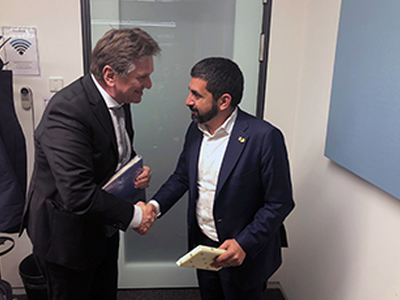- Exercising competences that have been recognised and are pending transfer, the Catalan government is preparing a decree that will regulate the reception of persons entitled to international protection and the process of helping them achieve full autonomy

The Executive Council of the Catalan government is preparing a decree that will regulate the reception of persons entitled to international protection and the process of helping them achieve full autonomy.
A series of rulings, including one issued by the Supreme Court, have concluded that policy related to the reception and integration of immigrants (and therefore refugees) falls within the competence of Spain’s autonomous communities, and that the state must transfer funding for programmes in this area. On the other hand, the state government has competence on border control and when it comes to determining the legal and administrative status of foreigners.
The decree that the Executive Council is working on will develop the Catalan Refugee Programme, an instrument for planning, coordinating, executing and assessing the policies of the Government of Catalonia in this area.
In this context, the governments of Catalonia and Baden-Württemberg have agreed to collaborate through the exchange of experiences in refugee policy. The Catalan Minister of Labour, Social Affairs and Families, Chakir el Homrani, talked about this cooperation following a meeting with Baden-Württemberg’s Minister of Social Affairs and Integration, Manne Lucha.
The experience of Baden-Württemberg
In Baden-Württemberg, 34.5% of the total population is foreign-born or of immigrant origin. It is one of the states with the highest level of immigration.
In 2015, the regional parliament passed the Participation and Integration Act, which aims to ensure that everyone, including people of immigrant origin, is able to participate in society on an equal footing. Under this legislation, the administration is required to provide support for persons of immigrant origin in language learning; establish structures that promote integration; support parents in the education of children and youth of immigrant origin; facilitate access to training for immigrants; strengthen social cohesion; combat any form of discrimination; combat forced marriage and any form of violence; and promote education aimed at ensuring acceptance and tolerance of diversity in schools and nurseries.
Importance of language learning
During the meeting between the ministers and a visit to the Patrick-Henry Village refugee centre in Heidelberg, the Catalan delegation focused on the importance of language learning in processes aimed at facilitating inclusion of immigrants.
In Catalonia, everyone who registers with a local council for the first time is entitled to receive reception services that include language training in Catalan and Spanish (a minimum of 90 hours for each language). This allows newcomers to achieve level A1 or A2 of the Common European Framework of Reference for Languages.
Interest in obtaining the first-reception certificates that entitle holders to these services has increased exponentially this year. In the first six months of 2019, 5897 new applications were processed (as many as in all of 2018), and the number is expected to reach 20,000 by the end of the year.